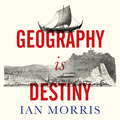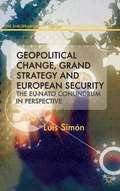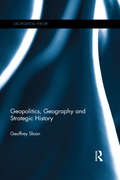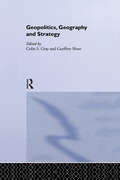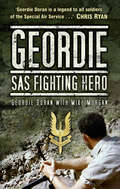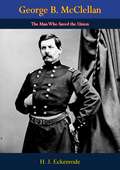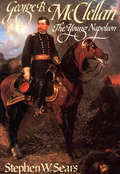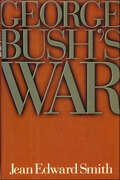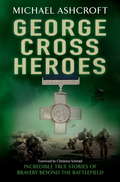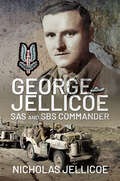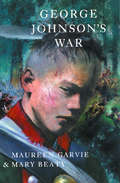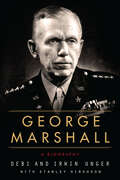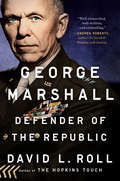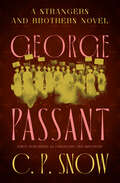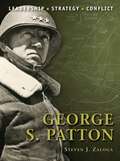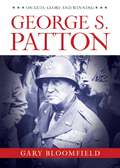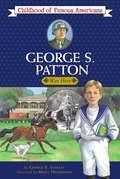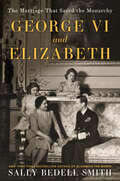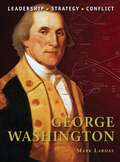- Table View
- List View
Geography Is Destiny: Britain and the World, a 10,000 Year History
by Ian MorrisGeography is Destiny tells the history of Britain and its changing relationships with Europe and the wider world, from its physical separation at the end of the Ice Age to the first flickers of a United Kingdom, struggles for the Atlantic, and rise of the Pacific Rim.Applying the latest archaeological evidence, Ian Morris explores how geography, migration, government and new technologies interacted to produce regional inequalities that still affect us today. He charts Britain's geopolitical fortunes over thousands of years, revealing its transformation from a European satellite into a state at the centre of global power, commerce, and culture. But as power and wealth shift from West to East, does Britain's future lie with Europe or the wider world?
Geopolitical Change, Grand Strategy and European Security: The EU–NATO Conundrum in Perspective (The European Union in International Affairs)
by Luis SimónExamining the interplay between geopolitics, the strategic priorities of Europe's most powerful nations, Britain, Germany and France, and the evolution of NATO and CSDP, this book unveils the mechanics of the tension between conflict and cooperation that lies at the heart of European security politics.
Geopolitics and the Great Powers in the 21st Century: Multipolarity and the Revolution in Strategic Perspective (Geopolitical Theory)
by C. Dale WaltonThis book argues that in the twenty-first century Eastern Eurasia will replace Europe as the theatre of decision in international affairs, and that this new geographic and cultural context will have a strong influence on the future of world affairs. For half a millennium, the great powers have practised what might be called ‘world politics’, yet during that time Europe, and small portions of the Near East and North Africa strategically vital to Europe, were the ‘centres of gravity’ in international politics. This book argues that the ‘unipolar moment’ of the post-Cold War era will not be replaced by a US-China ‘Cold War’, but rather by a long period of multipolarity in the twenty-first century. Examining the policy goals and possible military-political strategies of several powers, this study explains how Washington may play a key role in eastern Eurasian affairs if it can learn to operate in a very different political context. Dale Walton also considers the rapid pace of technological change and how it will impact on great power politics. Considering India, China, the US, Russia, Japan, and other countries as part of a multipolar system, he addresses the central questions that will drive US policy in the coming decades. Geopolitics and the Great Powers in the 21st Century will be of interest to students of international security, military history, geopolitics, and international relations.
Geopolitics, Geography and Strategic History (Geopolitical Theory)
by Geoffrey SloanThis volume examines geopolitics by looking at the interaction between geography, strategy and history. This book addresses three interrelated questions: why does the geographical scope of political objectives and subsequent strategy of states change? How do these changes occur? Over what period of time do these changes occur? The theories of Sir Halford Mackinder and Nicholas Spykman are examined in order to provide an analytical narrative for five case studies, four historical and one contemporary. Taken together they offer the prospect of converting descriptions of historical change into analytic explanations, thereby highlighting the importance of a number of commonly overlooked variables. In addition, the case studies will illuminate the challenges that states face when attempting to change the scope of their foreign policy and geo-strategy in response to shifts in the geopolitical reality. This book breaks new ground in seeking to provide a way to understand why and how the geographical scope of political objectives and subsequent strategy both expands and contracts. This book will be of much interest to students of geopolitics, strategic studies, military history, and international relations.
Geopolitics, Geography and Strategy
by Colin S. Gray Geoffrey SloanGeopolitical conditions influence all strategic behaviour - even when cooperation among different kinds of military power is expected as the norm, action has to be planned and executed in specific physical environments. The geographical world cannot be avoided, and it happens to be 'organized' into land, sea, air and space - and possibly the electromagnetic spectrum including 'cyberspace'. Although the meaning of geography for strategy is a perpetual historical theme, explicit theory on the subject is only one hundred years old. Ideas about the implication of geographical, especially spatial, relationships for political power - which is to say 'geopolitics'- flourished early in the twentieth century.Divided into theory and practice sections, this volume covers the big names such as Mackinder, Mahan and Haushofer, as well as looking back at the vital influence of weather and geography on naval power in the long age of sail (sixteenth to nineteenth centuries). It also looks forward to the consequences of the revival of geopolitics in post-Soviet Russia and the new space-based field of "astropolitics".
Geoproperty: Foreign Affairs, National Security and Property Rights
by Geoff DemarestSome innovations create new strategic property and new conflicts. Demarest argues that we have not reached the end of history and modern man will continue to fight over property as before, but the property will be of a post-modern character, such as electronic wavelengths and genetic codes.
Geordie: SAS Fighting Hero
by Mike Morgan Geordie DoranGeordie Doran ranks as one of the most remarkable fighting soldiers of the twentieth century. Growing up in Jarrow during the Depression years of the 1930s, Geordie signed up as a private soldier in 1946 and embarked on a career spanning 40 years. He saw active service in Germany, Cyprus, the Korean War and Suez; he became an expert in jungle warfare in Malaya and in Borneo, as well as on key special operations in the deserts of Oman and Yemen, and Colonel Gaddafi’s Libya. After returning to England in the early 1970s, a serious road accident curtailed his frontline soldiering career; however, he found a new and vital role as a permanent staff instructor with 23 SAS (TA) training the cream of recruits. He left the SAS in 1972, but could not settle into civilian life and found himself a job as a storeman in the SAS Quartermaster’s stores – a job which lasted another 12 years, during which time he equipped many famous SAS characters for their famous clandestine missions.
George B. McClellan: The Man Who Saved the Union
by H. J. Eckenrode Bryan ConradTHIS IS MORE THAN THE STORY OF “Little Mac.” It is the story also of that dark center of intrigue, the nation’s capital in 1862—of Washington shaking in its shoes for fear of an invasion by “gaunt hairy beings riding into Washington like Centaurs and perhaps setting fire to the Capitol”; a Washington dominated by politicians and partisans, where party strife and bitterness were so strong that some members of the government itself preferred Union defeat to a victory which might make a Democrat (McClellan) a national hero and a presidential possibility; a Washington in which even the President and his Cabinet showed a childish impatience because McClellan did not remove the threat to the capital overnight—in spite of a liquid terrain and “the greatest military combination in modern history, Lee and Jackson”; a Washington rotten with military gossip and spy-talk in back alleys….“THIS BOOK ORIGINATED in studies made by the historians of the Conservation Commission in the Richmond battlefield area, which is comprised in the Richmond Battlefield Park, a charge of the commission. These battlefields are the best preserved and least studied (because long inaccessible) in the country. A detailed examination of the terrain convinced the historians, both of them Southerners, that McClellan was a great general and that he has been underestimated by historians. Their opinion was confirmed by a study of the records. They came to the conclusion that it was McClellan who prevented the defeat of the North in 1861-62 when the Confederacy was relatively stronger than it was at a later time. Believing that politics should not be permitted to influence military judgments, they have written this book, partly for the purpose of doing justice to a great man who has suffered at the hands of history. It is based on the ground itself and the original sources, and is believed to be a contribution to American and Virginia history.”—Foreword
George B. McClellan: The Young Napoleon (Quality Paperbacks Ser.)
by Stephen W. Sears&“Sears has finally unraveled the mystique of this complex, brilliant Civil War general . . . A fascinating story&” (James M. McPherson, author of Battle Cry of Freedom). &“Commander of the Northern army in the Civil War, Gen. George McClellan saw himself as God&’s chosen instrument for saving the Union. Self-aggrandizing, with a streak of arrogant stubbornness, he set himself above President Lincoln, whom he privately called &‘the Gorilla.&’ To &‘the young Napoleon,&’ as McClellan&’s troops dubbed him, abolition was an &‘accursed doctrine.&’ Fond of conspiracy plots, he insisted that the Lincoln administration had traitorously conspired to set him up for military defeat. Although he constantly anticipated one big, decisive battle that would crush the South, he squandered one military opportunity after another, and, if Sears is correct, he was the worst strategist the Army of the Potomac ever had. Based on primary sources, letters, dispatch books, diaries, newspapers, this masterly biography is an astonishing portrait of an egotistical crank who could snatch defeat from the jaws of victory.&” —Publishers Weekly &“Engagingly written and thoroughly researched, Sears&’s persuasive critique is the best and most complete biography of this controversial general.&” —Library Journal &“The best biography of McClellan ever published. Sears uses intensive research, including new material, to document the tormented, wasted military career of a talented man . . . The enigma of McClellan has never been explained so well . . . Historians should be grateful.&” —The Washington Post Book World
George Bush's War
by Jean Edward SmithGeorge Bush's War by Jean Edward Smith chronicles the complete history of the 1991 Persian Gulf War. Smith takes the reader from the politics of Desert Shield to the military action of Desert Storm."Expressing constant misgivings about presidential warmaking, [Smith] provides a virtual day-by-day chronicle of the decisions of 1990 that led to war ... Highly recommended.” —Library Journal
George C. Marshall: Ordeal And Hope, 1939-1942
by Forrest PogueMarshall is seen here in all his public and private dealing with the other soldiers, statesmen, and politicians who shaped the course of the war.
George Cross Heroes
by Michael AshcroftThis ebook edition contains the full text version as per the book; but doesn't include original photographic and illustrated material. In a broadcast to the nation in September 1940 King George VI announced the institution of the George Cross - a civilian equivalent of the Victoria Cross awarded to recognize the many acts of supreme gallantry being performed outside of the battlefield. From Thomas Alderson, the first recipient of the medal, who heroically rescued several people from trapped houses during one terrible Blitz night, to Lance Corporal Matthew Croucher, who threw himself onto a live grenade in the Helmand province to save the lives of his comrades (and somehow survived), to Barbara Harrison, an air stewardess who died in 1968 after helping many passengers escape from an onboard fire, this book tells the amazing stories of everyone of the George Cross's 159 direct recipients. GEORGE CROSS HEROES pays tribute to the extraordinary courage displayed by so many of the commonwealth's men and women in so many incredible situations over the last 70 years.
George Jellicoe: SAS and SBS Commander
by Nicholas C. JellicoeGeorge Jellicoe, son of Admiral Sir John Jellicoe, commander of the British Grand Fleet at Jutland, was never compromised by his privileged upbringing. In this insightful biography, his son describes a life of action, drama, public service and controversy. George’s exploits with the newly formed SAS, as David Stirling’s second-in-command, and later commanding the SBS, make for fascinating reading. Over four years it embraced the North African and Mediterranean campaigns and culminated in the saving of a newly-liberated Athens from the communist guerrillas of ELAS. The brutality of Stalinist communism led him to join the post-war Foreign Office. In Washington he worked with Kim Philby and Donald Maclean in the cloak and dagger world of espionage. Resigning in 1958 so he could marry the woman he loved, he turned to politics. Although his ministerial career ended in 1973 after unwittingly become entangled with the Lambton scandal, he continued to sit in the House of Lords becoming ‘Father of the House’. He held numerous public appointments including President of the Royal Geographical Society, Chairman of the Medical Research Council, President of the SAS Regimental Association and the UK Crete Veterans Association. Thanks to the author’s research and access, this is more than a biography of a significant public figure. It provides fascinating detail of Special Forces operations and the characters of the countless figures with whom he mixed.
George Johnson's War
by Maureen Garvie Mary BeatyGeorge's cloistered life in New York changes as the War for American Independence looms and he must struggle with what it means to be half Mohawk. Young George Johnson lives in an extraordinary family in extraordinary times. His father is Sir William Johnson, one of the richest and most powerful men in colonial New York. His mother is Molly Brant, stepdaughter of a Mohawk chief and sister of Iroquois leader Joseph Brant. George spends his early years in a grand mansion called Johnson Hall, but his cloistered life changes as the War for American Independence looms. As the rebel forces gradually take over the valley, George and his family are forced to flee their home and seek refuge with Molly's friends and relatives. George longs to follow his brother's footsteps into battle. Instead, Molly sends him to boarding school in Montreal, where he spends three miserable years waiting for Peter's return. Finally, at the age of thirteen, he persuades his mother to allow him to join in a last raid on the valley where he grew up. In a riveting climax, he experiences first-hand the inglorious brutality and futility of the war, and struggles with what it means to be half Mohawk. And at last he learns the hard truth about the fate of his beloved brother. Correlates to the Common Core State Standards in English Language Arts: CCSS.ELA-LITERACY.RL.6.3 Describe how a particular story's or drama's plot unfolds in a series of episodes as well as how the characters respond or change as the plot moves toward a resolution. CCSS.ELA-LITERACY.RL.6.6 Explain how an author develops the point of view of the narrator or speaker in a text.
George Marshall: A Biography
by Irwin Unger Debi Unger“Elegant and iconoclastic . . . refreshing . . . persuasive.”—NEW YORK TIMES BOOK REVIEWHere is the first biography to offer a complete picture of the life of George C. Marshall, chief of staff of the U.S. Army from 1939 to 1945 and the military leader who actually ran World War II for America as he oversaw all personnel and logistics.Following Marshall from his childhood in western Pennsylvania and his training at the Virginia Military Institute to his role during and after World War II and his death in 1959 at the age of seventy-eight, this biography casts light on the inspiration he took from historical role models, such as George Washington and Robert E. Lee, and his relationships with military brass, the Washington political establishment, and world leaders, from Harry Truman to Chiang Kai-shek. It also explores Marshall’s triumphs and defeats during World War II, and his contributions through two critical years of the emerging Cold War—including the transformative Marshall Plan, which saved Western Europe from Soviet domination, and his failed attempt to unite China’s Nationalists and Communists.Based on exhaustive research and filled with rich detail, George Marshall is sure to be hailed as the definitive work on one of the most influential figures in American history.“A grand but judicious biography of a fascinating man.”—Evan Thomas, author of Ike’s Bluff
George Marshall: Defender of the Republic
by David L. RollThe extraordinary career of George Catlett Marshall—America&’s most distinguished soldier–statesman since George Washington—whose selfless leadership and moral character influenced the course of two world wars and helped define the American century. &“I&’ve read several biographies of Marshall, but I think [David] Roll&’s may be the best of the bunch.&”—Thomas E. Ricks, New York Times Book Review • &“Powerful.&”—The Wall Street Journal • &“Enthralling.&”—Andrew Roberts • &“Important.&”—William I. Hitchcock • &“Majestic.&”—Susan Page • &“Engrossing.&”—Andrew J. Bacevich • &“Judicious.&”—Walter Isaacson • &“Definitive.&”—Kirkus Winston Churchill called him World War II's "organizer of victory." Harry Truman said he was "the greatest military man that this country ever produced." Today, in our era of failed leadership, few lives are more worthy of renewed examination than Marshall and his fifty years of loyal service to the defense of his nation and its values. Even as a young officer he was heralded as a genius, a reputation that grew when in WWI he planned and executed a nighttime movement of more than a half million troops from one battlefield to another that led to the armistice. Between the wars he helped modernize combat training, and re-staffed the U.S. Army's officer corps with the men who would lead in the next decades. But as WWII loomed, it was the role of army chief of staff in which Marshall's intellect and backbone were put to the test, when his blind commitment to duty would run up against the realities of Washington politics. Long seen as a stoic, almost statuesque figure, he emerges in these pages as a man both remarkable and deeply human, thanks to newly discovered sources. Set against the backdrop of five major conflicts—two world wars, Palestine, Korea, and the Cold War—Marshall's education in military, diplomatic, and political power, replete with their nuances and ambiguities, runs parallel with America's emergence as a global superpower. The result is a defining account of one of our most consequential leaders.
George Orwell: The Political Pen
by Keith FerrellBorn as Eric Blair in India in 1903, George Orwell was a sickly child who was sent away to boarding school at age eight. Later he won a scholarship to Eton, where he was not a good student and earned a reputation as a rebel. Following Eton, he returned to Burma as a police officer, deliberately postponing his dream of becoming a writer.Orwell moved to Paris in 1928. He was concerned with the plight of the poor and was determined to find his own literary voice and themes. In the following years, he traveled and lived among the poor and unemployed. Orwell published several books and novels about his experiences, but success and recognition seemed slow in coming.In England, Orwell became known as an angry political writer and crusader for the left. He stood up for his convictions and fought in the Spanish Civil War, despite ill health. After this disillusioning experience, Orwell became an enemy of any form of totalitarianism.He tried to do his part for England under the Nazi siege through his journalism and broadcast scripts. Orwell completed Animal Farm during the war but was unable to find a publisher until the war was over.After the book&’s enormous success in 1946, Orwell planned another novel set in the future ina totalitarian society. Writing from his house on the island of Jura in the Scottish Hebrides, he created the story of Winston Smith, who lived in a world where Big Brother was always watching. This was his masterpiece, Nineteen Eighty-Four. Orwell died soon after its publication, but not before witnessing its success.In a special epilogue, Ferrell deals with Orwell&’s impact as a political moralist and the way in which the year 1984 has come to stand as a fearful symbol.
George Passant (The Strangers and Brothers Novels)
by C.P. SnowA wise, moving novel about a mentor and his protégé: &“The central character . . . is immensely appealing . . . a peculiarly haunting and sympathetic figure.&” —The New York Times In late 1920s England, Lewis Eliot is building a career in law and has found a mentor in George Passant. The quirky small-town solicitor&’s clerk has much wisdom to share from his years of experience—during which he has also managed to hold on to his idealism. Eliot is just one of the many young devotees drawn to Passant, hoping for guidance from the man who&’s always ready to extend a loan or a listening ear. However, the young men will have to learn to fly on their own—and come to Passant&’s aid themselves—in this absorbing novel by &“an extremely shrewd observer of men and society&” (Commentary). &“An enlightened discussion of questions of conscience and conduct and commitment. . . . Filled with the concerns which are so fundamentally and essentially a part of this writer&’s work and have attracted a firm following.&” —Kirkus ReviewsOriginally published under the title Strangers and Brothers
George S. Patton
by Steven Zaloga Steve NoonGeorge S. Patton Jr. was the iconic American field commander of World War II, and widely regarded as the US Army's finest practitioner of mechanized warfare. This title examines Patton's colorful life and leadership in three wars, with a concentration on his command in World War II. Despite his ability, Patton was thoroughly reviled by most GIs, partly due to his insistence on traditional military discipline in the ranks, but also because of his unwillingness to pander to the growing power of the press. This combination of ability and controversy have combined to make him one of the most interesting figures in American military history.Steven Zaloga's contribution to Osprey's newest series, Command, addresses this iconic figure from his early life to his life after war. Including an analysis of Patton's mind and motivations, strict training methods and the controversies surrounding Patton and his relationship with his soldiers and with Eisenhower, Zaloga's text is a concise but important look into the life of one of the most famous commanders of World War II.From the Trade Paperback edition.
George S. Patton: On Guts, Glory, and Winning
by Gary L. BloomfieldGeorge S. Patton: On Guts, Glory, and Winning relies on the writings, speeches, and poems of George Patton, and includes his prayer to stop the rain during the battle of northern Europe. What separates this book from all of the many about World War II&’s most famous battle commander is the extensive use of exquisite B&W combat photos on every spread, which illuminate the text on those pages. U.S. Army General George S. Patton is one of the greatest and most controversial battle commanders of World War II. His tactics were criticized by his detractors, lauded by his peers, and feared by the Nazis in North Africa, Sicily, France, and northern Europe. Some erroneously assumed he plunged his troops into battle with little or no forethought, but in fact he studied his opponent&’s writings and tactics, knew the terrain and weather conditions on anticipated fields of fire, and even relied on the Bible for guidance. Almost no other general or world leader from World War II has been written about more than Old Blood and Guts Patton – a nickname he hated. Even today, despite advances in weaponry and technology, military commanders still study his battle tactics.
George S. Patton: War Hero
by George E. StanleyChildren's fictionalized biography of the World War II hero.
George VI and Elizabeth: The Marriage That Saved the Monarchy
by Sally Bedell SmithA revelatory account of how the loving marriage of King George VI and Queen Elizabeth saved the monarchy during World War II, and how they raised their daughter to become Queen Elizabeth II, based on exclusive access to the Royal Archives—from the bestselling author of Elizabeth the Queen and Prince Charles&“An intimate and gripping portrait of a royal marriage that survived betrayal, tragedy, and war.&”—Amanda Foreman, bestselling author of Georgiana: Duchess of DevonshireGranted special access by Queen Elizabeth II to her parents&’ letters and diaries and to the papers of their close friends and family, Sally Bedell Smith brings the love story of this iconic royal couple to vibrant life. This deeply researched and revealing book shows how a loving and devoted marriage helped the King and Queen meet the challenges of World War II, lead a nation, solidify the public&’s faith in the monarchy, and raise their daughters, Princess Elizabeth and Princess Margaret.When King Edward VIII abdicated the throne in 1936, shattering the Crown&’s reputation, his younger brother, known as Bertie, assumed his father&’s name and became King George VI. Shy, sensitive, and afflicted with a stutter, George VI had never imagined that he would become King. His wife, Elizabeth, a pretty, confident, and outgoing woman who became known later in life as &“the Queen Mum,&” strengthened and advised her husband. With his wife&’s support, guidance, and love, George VI was able to overcome his insecurities and become an exceptional leader, navigating the country through World War II, establishing a relationship with Winston Churchill, visiting Franklin and Eleanor Roosevelt in Washington and in Hyde Park, and inspiring the British people with his courage and compassion during the Blitz. Simultaneously, George VI and Elizabeth trained their daughter Princess Elizabeth from an early age to be a highly successful monarch, and she would reign for an unprecedented seventy years.Sally Bedell Smith gives us an inside view of the lives, struggles, hopes, and triumphs of King George VI and Elizabeth during a dramatic time in history.
George Washington
by Mark Lardas Graham TurnerGeorge Washington may be one of history's most underrated commanders. Overlooked in favour of his contemporaries such as Napoleon Bonaparte and Frederick the Great, Washington's achievements are arguably more impressive. Frederick and Napoleon inherited formidable militaries, and both had extensive military training and experience prior to assuming command of armies. Washington built his army from scratch, was self-taught, and had never commanded anything larger than a regiment before assuming command of the Continental Army in 1775. This new Command title will track the development of Washington's military career from his early missteps to his heroic efforts during the Revolutionary War that led him on the path to the presidency.From the Trade Paperback edition.
George Washington
by Shelby LittleAn intimate revealing picture of a great figure that stands out clearly against the background of a young and vibrant America. Written with a view to removing some of the legends, mis-applied stories, apocryphal nonsense that had grown up around Washington. Renowned author Shelby Little expertly describes the man and his actions through the greatest era of American history aiming for a true and unvarnished picture.
